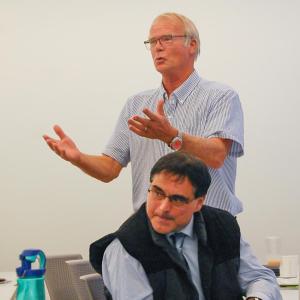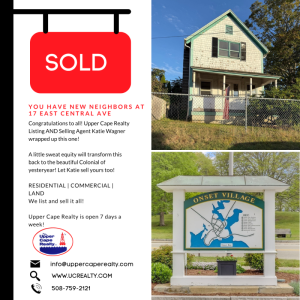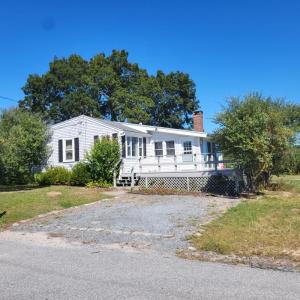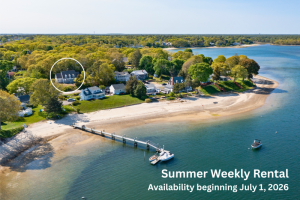Changing tides: Shellfishing solutions presented at summit
 Seth Garfield (back) asks a question and Vincent Furtado (front) listens. Photos by Mari Huglin
Seth Garfield (back) asks a question and Vincent Furtado (front) listens. Photos by Mari Huglin  Rep. Chris Markey speaks to the crowd.
Rep. Chris Markey speaks to the crowd.  All speakers and representatives present at the summit. (From left to right): Vincent Furtado, Audra Riding, Jen Downing, Mark Sylvia, Chris Markey, Susan Murray, Dale Leavitt, Seth Garfield, Liz Wiley and Christine Smith.
All speakers and representatives present at the summit. (From left to right): Vincent Furtado, Audra Riding, Jen Downing, Mark Sylvia, Chris Markey, Susan Murray, Dale Leavitt, Seth Garfield, Liz Wiley and Christine Smith. Liz Wiley, director of the Marion Institute, moderates the discuss with Representative Chris Markey.
Liz Wiley, director of the Marion Institute, moderates the discuss with Representative Chris Markey. Rep. Mark Sylvia presents details on the new shellfish legislation.
Rep. Mark Sylvia presents details on the new shellfish legislation.  Seth Garfield represents the Massachusetts Aquaculture Association.
Seth Garfield represents the Massachusetts Aquaculture Association. Dale Leavitt presents at the summit.
Dale Leavitt presents at the summit.  Seth Garfield (back) asks a question and Vincent Furtado (front) listens. Photos by Mari Huglin
Seth Garfield (back) asks a question and Vincent Furtado (front) listens. Photos by Mari Huglin  Rep. Chris Markey speaks to the crowd.
Rep. Chris Markey speaks to the crowd.  All speakers and representatives present at the summit. (From left to right): Vincent Furtado, Audra Riding, Jen Downing, Mark Sylvia, Chris Markey, Susan Murray, Dale Leavitt, Seth Garfield, Liz Wiley and Christine Smith.
All speakers and representatives present at the summit. (From left to right): Vincent Furtado, Audra Riding, Jen Downing, Mark Sylvia, Chris Markey, Susan Murray, Dale Leavitt, Seth Garfield, Liz Wiley and Christine Smith. Liz Wiley, director of the Marion Institute, moderates the discuss with Representative Chris Markey.
Liz Wiley, director of the Marion Institute, moderates the discuss with Representative Chris Markey. Rep. Mark Sylvia presents details on the new shellfish legislation.
Rep. Mark Sylvia presents details on the new shellfish legislation.  Seth Garfield represents the Massachusetts Aquaculture Association.
Seth Garfield represents the Massachusetts Aquaculture Association. Dale Leavitt presents at the summit.
Dale Leavitt presents at the summit. NEW BEDFORD — Frustrated South Coast shellfish farmers continue to struggle with strict policies implemented by the FDA. Government representatives and local initiatives look to change the tide.
The Marion Institute’s fifth annual Food Policy Summit took place on Friday, Oct. 3 at the UMass Dartmouth School for Marine Science and Technology and addressed shellfishing and pollution of the South Coast waterways, specifically addressing New Bedford sewage systems.
The summit’s goal was to explain the direct impacts of combined sewage overflows on the shellfishing industry, explore the legislative goals and opportunities to solve issues and potentially launch a local coalition to support change.
Farmers and legislators presented short, medium and long term goals for this combination of issues.
Combined sewage overflows, also known as CSOs, are when antiquated sewage systems become overwhelmed, usually after heavy rainfall, and waste overflows into Buzzards Bay.
Shellfish beds can be contaminated with pollutants from a variety of sources including boats, runoff from roads and farms near the shore and naturally occurring bacteria outbreaks.
Seth Garfield, the board president of the Massachusetts Aquaculture Association, said Massachusetts shellfish farmers “produce about 50 million oysters a year and with a value of approximately 30 to 40 million dollars.”
Garfield said “even with new funding sources, it will take decades to complete the work of cleaning up the CSOs. Aquaculture can't wait for this to happen.”
The sewage can infect shellfish with “vibrio cholera” leading to possible illness after consumption.
According to Dale Leavitt, a Mattapoisett oyster farmer, “39% of all combined sewage overflows in Massachusetts happen in New Bedford.”
He comtinued, “Five sewage outflow points are the cause of 75% of combined sewage overflows in the New Bedford area.”
Not only is pollution an issue that is affecting farmers, but stricter U.S. Food and Drug Administration policies have shut farming operations down after these overflows happen.
Farmers are not allowed to harvest shellfish for 21 days or more after a combined sewage overflow event.
“I probably lost somewhere in the vicinity of a quarter of a million dollars in 2024 because I couldn't sell oysters,” said Leavitt.
For a short term solution, Leavitt hopes working with legislators can provide a quick and effective solution to solving combined sewage overflow events.
For a medium length solution, farmers want to collect more data during combined sewage overflow events quicker. Right now water samples can only be analyzed a week after closures due to the labs being so far away.
The long term solution would be pleading with the FDA to loosen restrictions and finding other monetary solutions outside of taxes to update sewage systems.
Leavitt stated that his farm has been in operation for over 25 years. His farm and others “have served millions of raw oysters that are coming from locations that are currently closed routinely under CSO closures and there hasn't been a single illness.”
Audra Riding, a representative of Sen. Mark Montigny, Rep. Christopher Markey and Rep. Mark Sylvia were present to hear community complaints and offer solutions.
Riding said, “We need everybody to get out of their silos, get to the same table, and have a conversation on what can we do as a region to begin addressing this, because this problem is not going away.”
The legislators explained their bill which proposes the creation of a Coastal Waters Wastewater Financing Committee.
This committee would be tasked with identifying revenue sources to fund essential wastewater infrastructure improvements.
Sylvia explained solutions will be expensive and said, “The biggest issue that we face is cost, and the inability of cities and towns and ratepayers to bear the full costs of those project upgrades.”
Markey reiterated that finding support and lobbying is crucial to create change.
Markey said, “If we get that out there and we educate not only the administration but also the other legislators and everyone in the state, I think we'll be much more successful.”
The bill specifically targets nitrogen pollution and outdated sewer systems that threaten coastal ecosystems and public health in Acushnet, Carver, Dartmouth, Fairhaven, Lakeville, Gosnold, Marion, Mattapoisett, Middleborough, New Bedford, Plymouth, Rochester, Wareham and Westport.










































